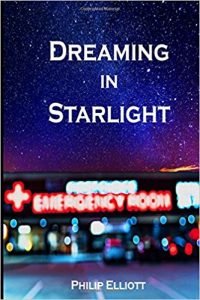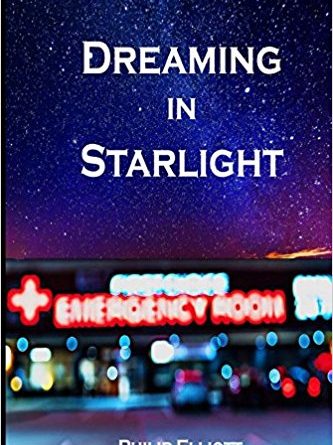Dreaming in Starlight by Philip Elliott
-Reviewed by Scott Manley Hadley–
Dreaming in Starlight is Philip Elliott’s debut, released by internationally-focused independent publishing group, Creative Talents Unleashed (CTU). Elliott is from Dublin, but his book is set somewhere rural in the Southern States of the USA. While Dreaming in Starlight successfully evokes an individual’s mind and its descent into madness, the book’s lack of geographic specificity is conspicuously unignorable.

I been in prison for a while […] and a mental hospital, too […] I think I came out worse than I went in.
The book’s protagonist is JJ Watts, an unhappy man. He has died alone, aged 26, in a wooden hut destroyed by a forest fire, leaving behind a cache of unsent letters which form the content of the book. Addressees include people he loved, people he hated, people he wronged and people he felt wronged him. As well as family members and former lovers, these include God, Satan, the forest trees, and JJ himself. The letters reveal a slow, but relentless, psychological demise, as JJ remorsefully reflects on the errors he committed, broken because his transgressions are irreversible. Elliott pulls us tight into this fragmented and fragmenting figure’s mind and we see him become more desperate and scared then – a flicker before the flames – momentarily hopeful. Elliott evokes a lonely tragedy with moving prose and a strong, characterful, voice, yet fails to satisfyingly locate the narrative in terms of place.
Where does a man run to when the screams come from inside of him?
Elliott’s book is set in the same locales as iconic texts by writers like Cormac McCarthy and Marilynne Robinson, but the only real clue towards this is JJ’s voice. The text is reliant, therefore, on a reader extrapolating setting using their own prior knowledge when confronted with a familiar voice. One could argue that this is Elliott eschewing unnecessary detail, or that the text’s epistolary form justifies any lack as deliberate, i.e. the character, not the author. This second point would be false, as JJ is very concerned with names and accuracy. The letters represent an attempt to order thoughts, to impose control on feelings through a catalogue of sins and regrets: these letters are confessions and JJ always names the people, objects and institutions they concern. To not name place is out of character, which is why it’s problematic.
I’m swallowed whole by the void in the depths of me.
However, as Dreaming in Starlight progresses, there arises an exciting ambiguity: could these letters – and this ‘life in the woods’ – be a hallucination? And, if so, the placelessness in the present would be entirely justified.
Every time I wake up, I feel like I’m entering a dream.
As JJ doubts his own experiential evidence, the reader is pulled into his broken, addled, psyche and moves towards feeling as overwhelmed by life as the protagonist. Unfortunately, though, this successfully-evoked confusion is undercut by the book’s diegetic Introduction, which unequivocally cites the collection of letters as a ‘found’ text. Without this, Elliott’s fictional world could have been an entirely psychological one, a hinterland both metaphorical and not, but in the world of the text, JJ was explicitly ‘in the woods’. (Though even had he not been, the geographical vagueness in his memories would still chafe.)
Yesterday I saw a baby deer drink from a stream with its mama. Damn near the most beautiful thing I ever saw.
There’s some great writing here, and Elliott’s plot is a believable narrative of a poor man failing to break out of cycles of violence and addiction, and it’s told in a near perfectly-consistent voice. However, Dreaming in Starlight feels a little underdone. A bit more work and the problems with the text would have disappeared, for its confusing placelessness diminishes an otherwise successful book. But Elliott is young, so has plenty of time to hone his craft. There’s lots in Dreaming in Starlight to love, even with its flaws.





